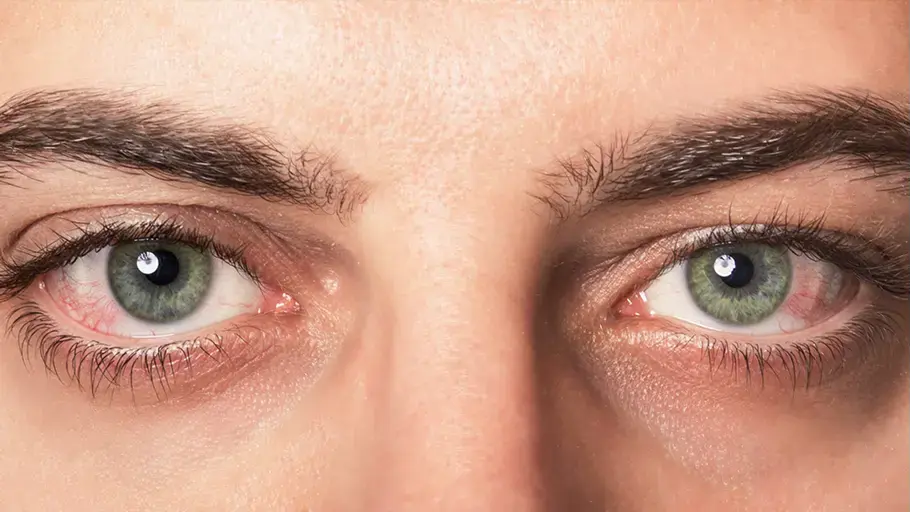That’s because both conditions are a type of conjunctivitis2.
Obviously, this makes it easy to confuse the two. However, the underlying causes of pink eye vs allergies are different, so understanding what separates the two is important so you can get the right treatment.
Learn more about the difference between pink eye and allergies, and take our quiz to see if it’s allergies or pink eye that may be causing your symptoms.
What is Conjunctivitis?
Conjunctivitis is a condition that occurs when the tissue lining the inside surface of your eyelid and outer coating of your eye becomes inflamed2. The blood vessels here can become more visible as they inflame, which is what results in that tell-tale redness or pink color4.
Conjunctivitis is very common in children and adults – with between three and six million cases in the US every year2. One or both eyes may be affected by conjunctivitis, and whether it’s infectious or not depends on the underlying cause.
There are various types of conjunctivitis, but the three main kinds are3:
Bacterial conjunctivitis – different types of bacteria, often from your skin or breathing system, or someone else’s, can cause an infection that results in this. It is contagious, and may occur alongside strep throat and other symptoms.
Viral conjunctivitis – this is the most common type, and highly contagious. Viruses behind the common cold, a runny nose and sore throat are often the cause, leading to burning red eyes.
Allergic conjunctivitis – people with seasonal or other allergies who are exposed to an allergen – such as pollen, pet dander or dust – can experience a reaction in their eyes. It can cause your eyes to become red, itchy, watery, and puffy. Allergic conjunctivitis is not infectious.
Pink Eye (Conjunctivitis) Causes and Symptoms4
Pink eye is the common name for conjunctivitis, and usually results from touching a contaminated surface, person or developing another illness – such as sinus and ear infections. When your eye is exposed to bacteria this way, it can lead to various pink eye symptoms.
What Causes Pink Eye?
Your eye(s) react after being exposure to bacteria, as the conjunctiva (membrane lining your eyelid) gets infected and inflames4.
Some common bacteria that can cause pink eye include2:
Staphylococcus aureus
Haemophilus influenzae
Streptococcus pneumonia
Pseudomonas aeruginosa
Can Allergies Cause Pink Eye?
Allergic conjunctivitis is a type of pink eye that comes from an allergic reaction3. Allergic conjunctivitis, however, is not contagious and can be treated by taking antihistamines, such as ZYRTEC®. Check out our guide to learn more about how allergies can cause pink eye.
Pink Eye Symptoms
If you experience pink eye through bacterial or viral conjunctivitis, it can affect one or both of your eyes. Some of the main pink eye symptoms can include4:
Redness
Itchy eyes
Gritty feeling in your eye(s)
Discharge that forms a crust overnight
Increased tear production
Eye Allergies (Allergic Conjunctivitis) Causes and Symptoms
Allergic conjunctivitis is caused by exposure to allergens5. The membrane covering your eyeball swells and becomes irritated due to the presence of a substance that triggers an allergic reaction5. Your body produces histamines to fight off the allergens, which can result in inflammation6.
What Causes Allergic Conjunctivitis?
Eyes are exposed to the air and very sensitive, which can make them an easy target for allergens6. The presence of an allergen in one or both eyes can trigger the immune system to produce histamines to flush them out. This can encourage inflammation and cause itchy, red eyes.
Some of the main allergens that can cause allergic conjunctivitis include5:
Pollen – grass, tree and weed especially
Pet dander – dead skin and fur
Smoke and air pollution
Cosmetics, make-up, and perfume
Certain types of medication
Allergic Conjunctivitis Symptoms
Many symptoms of allergic conjunctivitis can be the same as bacterial or viral conjunctivitis – including red, itchy eyes and a gritty feeling. As well as these there are a few symptoms more commonly associated with allergies rather than pink eye, including6:
Swollen eyelids
Watery eyes
Eye pain
Burning sensation
You might also experience other symptoms related to your allergies alongside those affecting your eyes, such as6:
Coughing
Sinus headache
Is Allergic Conjunctivitis Contagious?
No, allergic conjunctivitis is not contagious, so there’s no risk of you passing it on to anyone else. It’s one of the main differences with bacterial and viral conjunctivitis, which can both be spread easily.
Eye Allergies vs Pink Eye Quiz
Unsure if allergies or pink eye are causing the redness in your eyes? Take this quick quiz to see which be the cause, so you can get the right relief.
Are both eyes red?

Yes
Allergies usually affect both eyes at the same time, following exposure to an allergen.

No
Pink eye often occurs in just the left or right eye to begin with — though it can spread to both.
Do your eyes feel itchy?

Yes
Itchiness and a gritty feeling in your eyes are common symptoms of allergies.

No
Bacterial conjunctivitis is less likely to cause itchy eyes.
Do you have swollen, puffy eyelids?

Yes
An allergic reaction can cause your eyelids to swell up, making them look and feel puffy.

No
If your eyelids or lashes feel sticky but aren’t swollen, it’s more likely to be pink eye.
Is your nose running?

Yes
A runny nose is a common symptom of allergies, especially combined with red eyes.

No
If your nose isn’t running, then bacteria or a virus are more likely the cause of pink eye.
Are you sneezing or have a sore throat?

Yes
Sneezing and a sore throat, alongside redness in your eyes, are typical signs of allergic reactions.

No
Without common allergy symptoms, it is more likely to be bacterial or viral pink eye.
What to do if you think you have allergies?
Visit your doctor for a professional diagnosis and treatment options. You can also find powerful allergy relief with the ZYRTEC® family of products. If hay fever is your allergy, download the ZYRTEC® AllergyCast® app* for a daily pollen forecast and track your allergy symptoms.
*Standard data rates for your plan apply
How to Treat Your Eye Allergies or Pink Eye Symptoms
The right pink eye treatment or eye allergy treatment can vary depending on the underlying cause and your symptoms.
Viral conjunctivitis, or viral pink eye, can resolve itself in a few days or up to two weeks2. Typical bacterial pink eye treatments may include a prescription for antibiotics. These can be eye drops, ointment, or pills2.
A common eye allergy treatment, meanwhile, is to take over-the-counter (OTC) antihistamines, which may also be in the form of eye drops or pills4. Other medication that helps control inflammation may also be prescribed by a doctor, such as4:
Decongestants
Steroids
Anti-inflammatory drops
See your doctor for a professional diagnosis and prescription for the right medication.
How ZYRTEC® Can Relieve Eye Allergies
ZYRTEC® products are OTC medicines containing the antihistamine cetirizine hydrochloride (HCL). This helps fight off the histamines produced when you have an allergic reaction, providing relief from your allergic conjunctivitis symptoms.
The main ZYRTEC® products you can use to try and relieve your eye allergy symptoms are:
ZYRTEC® tablets – treat indoor and outdoor allergy symptoms for 24 hours with each tablet
ZYRTEC® liquid gels – fast-acting liquid gel that relieves allergy symptoms
ZYRTEC®-D tablets – proven allergy relief combined with a decongestant
Tips on How to Relieve and Prevent Pink Eye at Home
If you experience pink eye symptoms not caused by allergies, you should first seek a professional medical diagnosis. Your doctor may prescribe antibiotics or antiviral medication to help relieve your symptoms. Please remember that ZYRTEC® products are not designed to treat pink eye caused by a viral or bacterial infection.
A few simple measures to help relieve and prevent pink eye at home include4:
Cleaning your eyelids with a wet cloth
Refraining from wearing contact lenses until treatment is complete
Avoiding rubbing or touching your eyes
Applying a cold or warm compresses every day7
References
https://my.clevelandclinic.org/health/diseases/8614-pink-eye-conjunctivitis
https://www.aao.org/eye-health/diseases/pink-eye-conjunctivitis
https://www.mayoclinic.org/diseases-conditions/pink-eye/symptoms-causes/syc-20376355
https://www.mayoclinic.org/diseases-conditions/pink-eye/diagnosis-treatment/drc-20376360
Links to other parties’ articles and websites are provided for convenience only. Kenvue is not responsible for their content.


